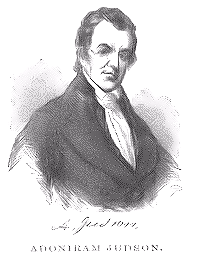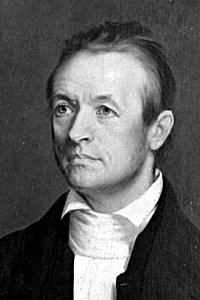Introduction

Born: August 9, 1788, Malden, Massachusetts.
Died: April 12, 1850, Bay of Bengal, near Burma.
Buried: At sea.


Born: August 9, 1788, Malden, Massachusetts.
Died: April 12, 1850, Bay of Bengal, near Burma.
Buried: At sea.

Adoniram was the son of Congregational minister Adoniram Judson Sr. and Abigail Brown.
When but four years of age, [he] seemed to foreshadow his future career. Gathering the children of the neighborhood around him, he was wont to mount a chair, and go through a preaching service with marked earnestness. His favorite hymn on these occasions was one of Watts’, commencing:
During his course of study at Providence college, a circumstance occurred that changed the whole future of his life. In his class was a young man named E—, to whom he was warmly attached, and by whose influence he was led into professed infidelity, to the great grief of his devoted parents.
Starting out on a traveling tour at the close of his school, Judson assumed another name and joined a theatrical company in New York.
Whenever the thought of a mother’s tears would occur, he tried to soothe his conscience by saying,
I am in no danger, I am only seeing the world, the dark side of it as well as the bright.After a while, pursuing his journey westward, he stopped at a country inn. As the landlord took him to his bedroom, he said:
I am obliged to place you next door to a young man who is exceedingly ill, probably in a dying state, but I hope it will occasion you no uneasiness.It proved, however, a very restless night; groans were frequently heard, and other sounds that made him think of Eternity.
Alone, and in the dead of night, he felt the props of his infidelity give way. Then he would try to shame his fears, by thinking what his witty, clear-minded intellectual E— would say to such consummate boyishness.
At last, morning came, and the bright flood of light which poured into his chamber dispelled all his superstitious illusions. Going in search of the landlord, he made inquiry about his fellow-lodger.
He is dead,was the reply.Dead!Yes, he is gone, poor fellow!Do you know who it was?O yes, it was a young man from Providence College—a very fine fellow, his name was E—.Judson was completely stunned. He knew not what to say or do.
Dead—Lostwere the two words that kept ringing in his head.He could go no further in his journey. This death-scene of his infidel companion was the pivot on which turned his destiny, both for time and eternity.
Judson afterwards entered the Theological Seminary at Andover [Massachusetts], became a decided Christian, and after reading
The Star in the East,resolved to become a missionary.After marrying Miss Ann H. Hasseltine, a young Christian lady as earnest and devoted as she was accomplished and beautiful, the two set sail for the realms of heathen darkness, on the 19th of February, 1812.
Just as they were getting under way with their missionary work at Ava, the capital of Burma [Myanmar], war broke out, and Mr. Judson and others were violently seized as English spies and cast into the death prison.
During nine months, he was stretched on the bare floor, bound by three pairs of iron fetters, and fastened to a long pole to prevent his moving. This was during the hot season, too, when he was shut up with a hundred prisoners in a room without any windows, or any appliances by which a breath of air could be admitted, except through the cracks in the boards.
They were all obliged to lie in a row upon the floor, without a mattress, or even so much as a wooden block, which they begged might be granted them for a pillow.
His whole period of indescribable suffering continued for one year and seven months. Yet from this dark prison issued a hymn of praise that is now echoing around this world in the psalmody of the church. Judson dates it,
Prison, Ava, March 1825.It is a versification of the Lord’s Prayer, and shows the thoughts and feelings that filled his heart during his long protracted agony. He says it is comprised in fewer words than the original Greek, and in only two more words than the common translation:—
Our father, God, who art in heaven,
All hallowed be thy name;
Thy kingdom come; thy will be done
In heaven and the earth the same.
Give us this day our daily bread;
And as we those forgive
Who sin against us, so may we
Forgiving grace receive.
Into temptation lead us not,
From evil set us free;
And thine the kingdom, thine the power
And glory, ever be.…
His loving wife, knowing what the
daily breadmeant in such a prison, arranged, by means of some buffalo meat and plantains, to get up a mince pie, at least in appearance.But when it arrived in prison, its associations brought so vividly to mind the old comforts of home, that he bowed his head upon his knees, and wept till the tears flowed down to the chains about his ankles.
Through his flowing tears he saw the home of his boyhood again—his gentle mother, his revered father, his much loved sister and brother around the noonday meal.
His heart was too full to partake of the delicious morsel, and so he thrust it into the hand of an associate.
In this time of trial he addressed thirty stanzas to his infant daughter, who, when twenty days old, was brought into prison to receive a father’s kiss. The lines began:
Sleep, darling infant, sleep,
Hushed on thy mother’s breast;
Let no rude sound of clanking chains,
Disturb thy balmy rest.And yet after passing through all these privations and painful experiences, he could brush away his tears, and write:—
Sovereign love appoints the measure,
And the number of our pains,
And is pleased when we take pleasure
In the trials he ordains.In 1850, Judson’s health had so broken down that his only hope for restoration was a protracted sea voyage. On the 3rd of April, he embarked on a vessel, bound to the Isle of France [now Mauritius].
Nine days later, while out at sea, he breathed his last, and all that was mortal of Dr. Judson was committed to the ocean’s deep, where his dust is rocked by the mighty billows, till, to sea and land, God’s angel shall declare
that there should be time no longer.Long, pp. 234–39